University Economics Report: FDI and Economic Development in Africa
VerifiedAdded on 2023/01/16
|14
|3922
|58
Report
AI Summary
This economics report examines the role of Foreign Direct Investment (FDI) in Sub-Saharan Africa, highlighting its significance for economic development. The report discusses the benefits of FDI, including capital inflow, technology transfer, and job creation, while also addressing challenges like political instability and infrastructure limitations. It provides an overview of inward FDI, factors affecting FDI in Tanzania and Nigeria, and constraints to investment, such as shortage of foreign exchange and lower rates of return. The report also explores the importance of natural resources, government regulations, and infrastructure as key drivers for FDI. Overall, the analysis underscores the vital role of FDI in stimulating economic growth and improving human capital in the region, while acknowledging the need for addressing various challenges to attract and sustain investment flows.

Running head: ECONOMICS
Economics
Name of the student
Name of the university
Author note
Economics
Name of the student
Name of the university
Author note
Paraphrase This Document
Need a fresh take? Get an instant paraphrase of this document with our AI Paraphraser
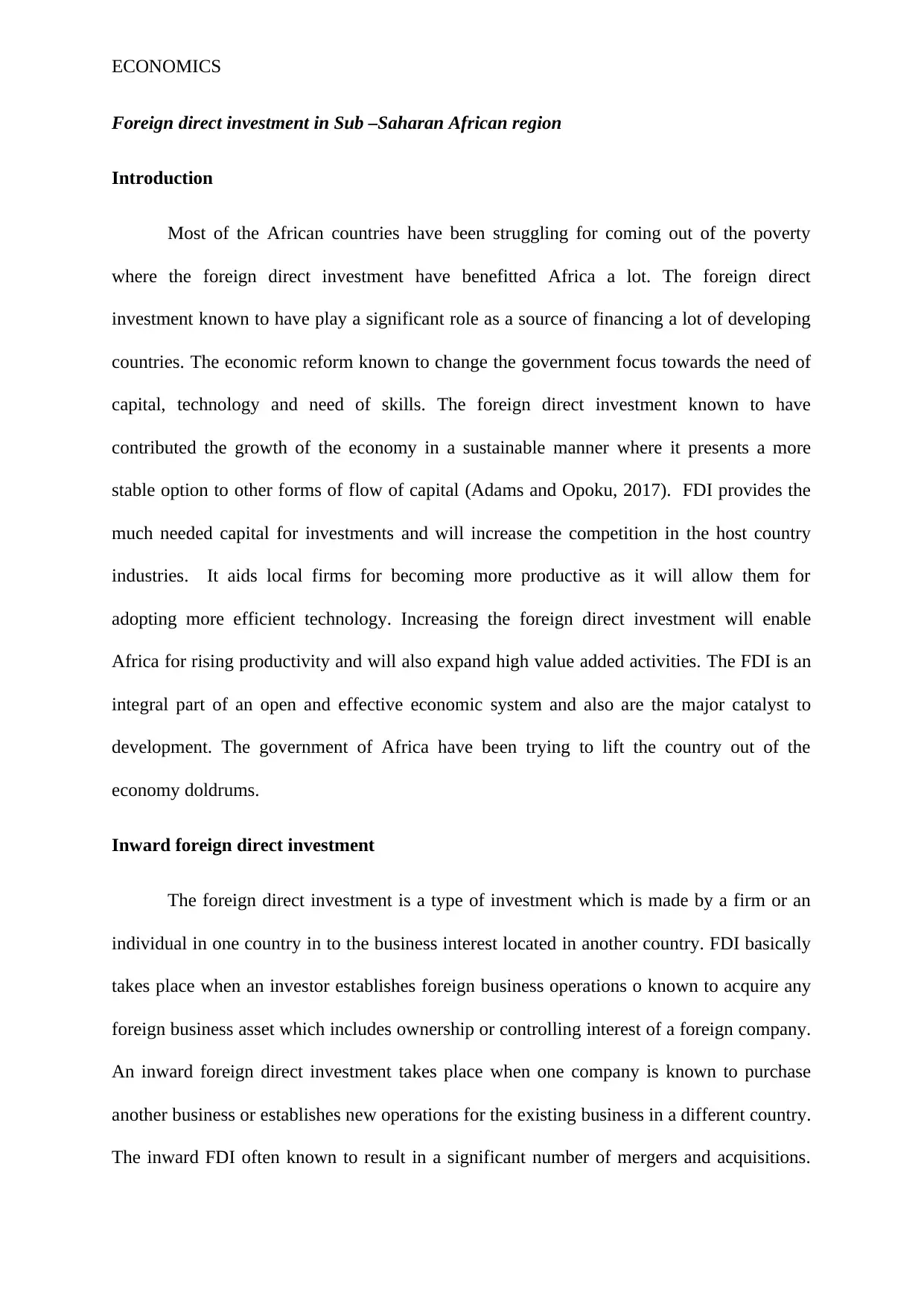
ECONOMICS
Foreign direct investment in Sub –Saharan African region
Introduction
Most of the African countries have been struggling for coming out of the poverty
where the foreign direct investment have benefitted Africa a lot. The foreign direct
investment known to have play a significant role as a source of financing a lot of developing
countries. The economic reform known to change the government focus towards the need of
capital, technology and need of skills. The foreign direct investment known to have
contributed the growth of the economy in a sustainable manner where it presents a more
stable option to other forms of flow of capital (Adams and Opoku, 2017). FDI provides the
much needed capital for investments and will increase the competition in the host country
industries. It aids local firms for becoming more productive as it will allow them for
adopting more efficient technology. Increasing the foreign direct investment will enable
Africa for rising productivity and will also expand high value added activities. The FDI is an
integral part of an open and effective economic system and also are the major catalyst to
development. The government of Africa have been trying to lift the country out of the
economy doldrums.
Inward foreign direct investment
The foreign direct investment is a type of investment which is made by a firm or an
individual in one country in to the business interest located in another country. FDI basically
takes place when an investor establishes foreign business operations o known to acquire any
foreign business asset which includes ownership or controlling interest of a foreign company.
An inward foreign direct investment takes place when one company is known to purchase
another business or establishes new operations for the existing business in a different country.
The inward FDI often known to result in a significant number of mergers and acquisitions.
Foreign direct investment in Sub –Saharan African region
Introduction
Most of the African countries have been struggling for coming out of the poverty
where the foreign direct investment have benefitted Africa a lot. The foreign direct
investment known to have play a significant role as a source of financing a lot of developing
countries. The economic reform known to change the government focus towards the need of
capital, technology and need of skills. The foreign direct investment known to have
contributed the growth of the economy in a sustainable manner where it presents a more
stable option to other forms of flow of capital (Adams and Opoku, 2017). FDI provides the
much needed capital for investments and will increase the competition in the host country
industries. It aids local firms for becoming more productive as it will allow them for
adopting more efficient technology. Increasing the foreign direct investment will enable
Africa for rising productivity and will also expand high value added activities. The FDI is an
integral part of an open and effective economic system and also are the major catalyst to
development. The government of Africa have been trying to lift the country out of the
economy doldrums.
Inward foreign direct investment
The foreign direct investment is a type of investment which is made by a firm or an
individual in one country in to the business interest located in another country. FDI basically
takes place when an investor establishes foreign business operations o known to acquire any
foreign business asset which includes ownership or controlling interest of a foreign company.
An inward foreign direct investment takes place when one company is known to purchase
another business or establishes new operations for the existing business in a different country.
The inward FDI often known to result in a significant number of mergers and acquisitions.
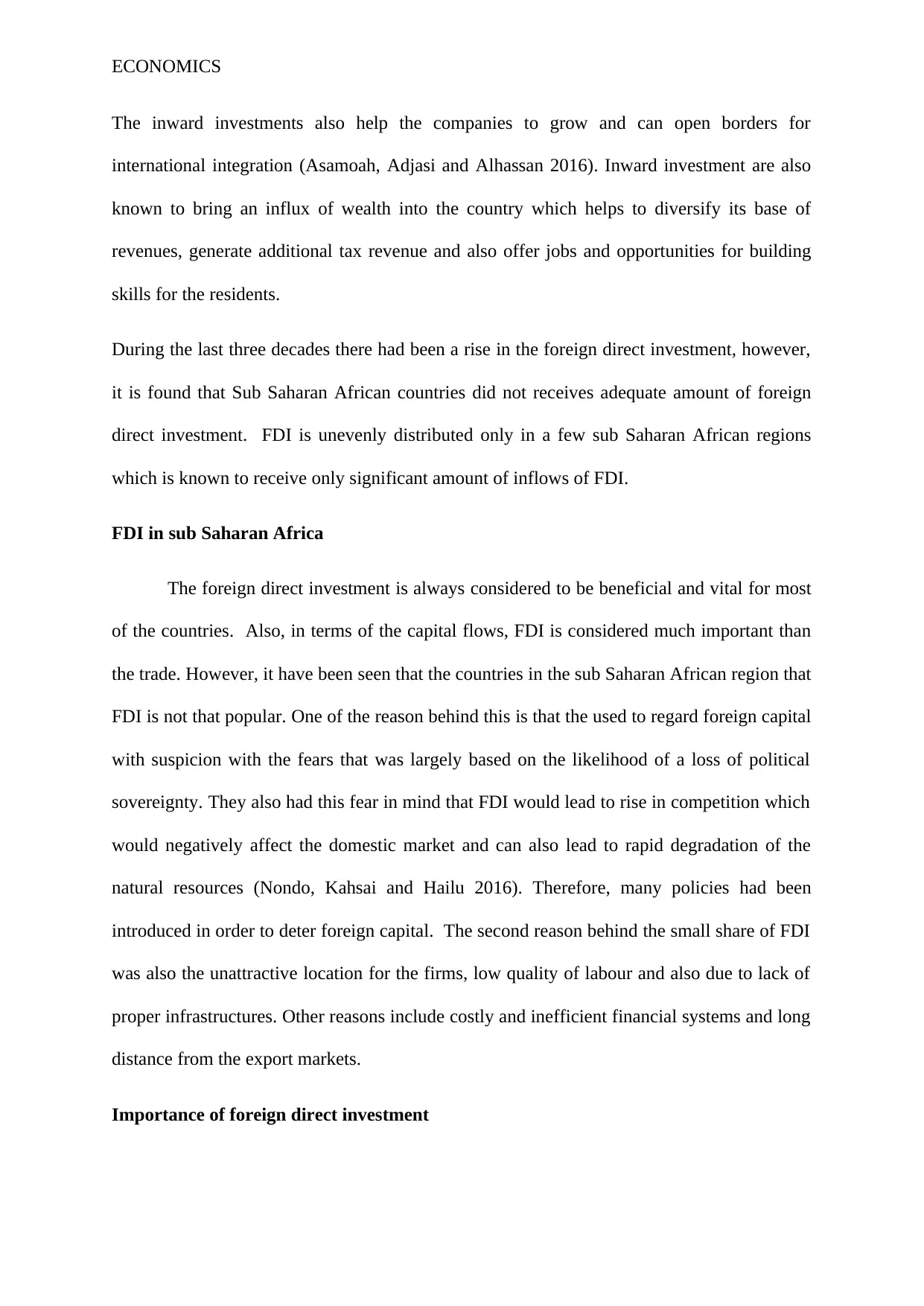
ECONOMICS
The inward investments also help the companies to grow and can open borders for
international integration (Asamoah, Adjasi and Alhassan 2016). Inward investment are also
known to bring an influx of wealth into the country which helps to diversify its base of
revenues, generate additional tax revenue and also offer jobs and opportunities for building
skills for the residents.
During the last three decades there had been a rise in the foreign direct investment, however,
it is found that Sub Saharan African countries did not receives adequate amount of foreign
direct investment. FDI is unevenly distributed only in a few sub Saharan African regions
which is known to receive only significant amount of inflows of FDI.
FDI in sub Saharan Africa
The foreign direct investment is always considered to be beneficial and vital for most
of the countries. Also, in terms of the capital flows, FDI is considered much important than
the trade. However, it have been seen that the countries in the sub Saharan African region that
FDI is not that popular. One of the reason behind this is that the used to regard foreign capital
with suspicion with the fears that was largely based on the likelihood of a loss of political
sovereignty. They also had this fear in mind that FDI would lead to rise in competition which
would negatively affect the domestic market and can also lead to rapid degradation of the
natural resources (Nondo, Kahsai and Hailu 2016). Therefore, many policies had been
introduced in order to deter foreign capital. The second reason behind the small share of FDI
was also the unattractive location for the firms, low quality of labour and also due to lack of
proper infrastructures. Other reasons include costly and inefficient financial systems and long
distance from the export markets.
Importance of foreign direct investment
The inward investments also help the companies to grow and can open borders for
international integration (Asamoah, Adjasi and Alhassan 2016). Inward investment are also
known to bring an influx of wealth into the country which helps to diversify its base of
revenues, generate additional tax revenue and also offer jobs and opportunities for building
skills for the residents.
During the last three decades there had been a rise in the foreign direct investment, however,
it is found that Sub Saharan African countries did not receives adequate amount of foreign
direct investment. FDI is unevenly distributed only in a few sub Saharan African regions
which is known to receive only significant amount of inflows of FDI.
FDI in sub Saharan Africa
The foreign direct investment is always considered to be beneficial and vital for most
of the countries. Also, in terms of the capital flows, FDI is considered much important than
the trade. However, it have been seen that the countries in the sub Saharan African region that
FDI is not that popular. One of the reason behind this is that the used to regard foreign capital
with suspicion with the fears that was largely based on the likelihood of a loss of political
sovereignty. They also had this fear in mind that FDI would lead to rise in competition which
would negatively affect the domestic market and can also lead to rapid degradation of the
natural resources (Nondo, Kahsai and Hailu 2016). Therefore, many policies had been
introduced in order to deter foreign capital. The second reason behind the small share of FDI
was also the unattractive location for the firms, low quality of labour and also due to lack of
proper infrastructures. Other reasons include costly and inefficient financial systems and long
distance from the export markets.
Importance of foreign direct investment
⊘ This is a preview!⊘
Do you want full access?
Subscribe today to unlock all pages.

Trusted by 1+ million students worldwide
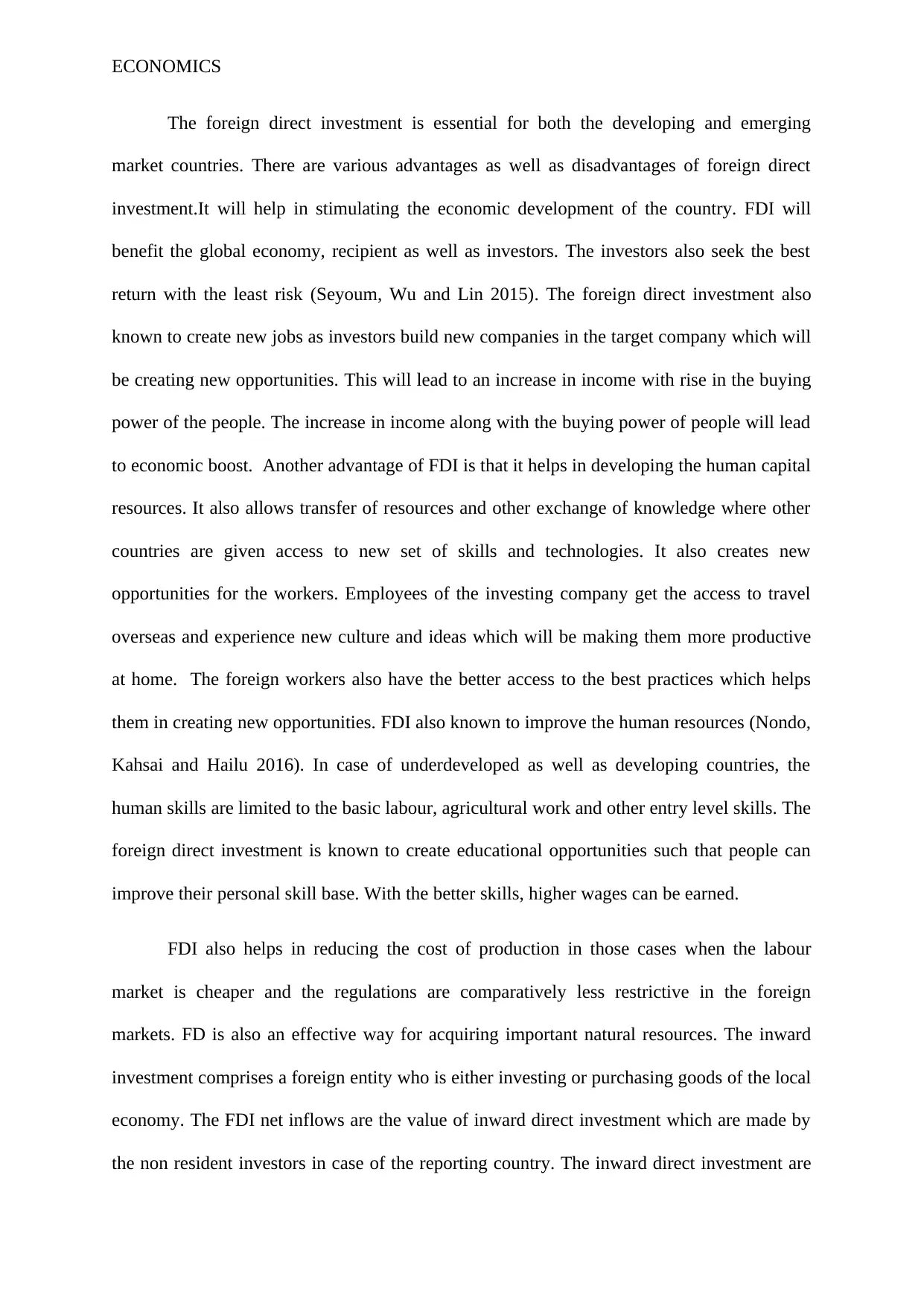
ECONOMICS
The foreign direct investment is essential for both the developing and emerging
market countries. There are various advantages as well as disadvantages of foreign direct
investment.It will help in stimulating the economic development of the country. FDI will
benefit the global economy, recipient as well as investors. The investors also seek the best
return with the least risk (Seyoum, Wu and Lin 2015). The foreign direct investment also
known to create new jobs as investors build new companies in the target company which will
be creating new opportunities. This will lead to an increase in income with rise in the buying
power of the people. The increase in income along with the buying power of people will lead
to economic boost. Another advantage of FDI is that it helps in developing the human capital
resources. It also allows transfer of resources and other exchange of knowledge where other
countries are given access to new set of skills and technologies. It also creates new
opportunities for the workers. Employees of the investing company get the access to travel
overseas and experience new culture and ideas which will be making them more productive
at home. The foreign workers also have the better access to the best practices which helps
them in creating new opportunities. FDI also known to improve the human resources (Nondo,
Kahsai and Hailu 2016). In case of underdeveloped as well as developing countries, the
human skills are limited to the basic labour, agricultural work and other entry level skills. The
foreign direct investment is known to create educational opportunities such that people can
improve their personal skill base. With the better skills, higher wages can be earned.
FDI also helps in reducing the cost of production in those cases when the labour
market is cheaper and the regulations are comparatively less restrictive in the foreign
markets. FD is also an effective way for acquiring important natural resources. The inward
investment comprises a foreign entity who is either investing or purchasing goods of the local
economy. The FDI net inflows are the value of inward direct investment which are made by
the non resident investors in case of the reporting country. The inward direct investment are
The foreign direct investment is essential for both the developing and emerging
market countries. There are various advantages as well as disadvantages of foreign direct
investment.It will help in stimulating the economic development of the country. FDI will
benefit the global economy, recipient as well as investors. The investors also seek the best
return with the least risk (Seyoum, Wu and Lin 2015). The foreign direct investment also
known to create new jobs as investors build new companies in the target company which will
be creating new opportunities. This will lead to an increase in income with rise in the buying
power of the people. The increase in income along with the buying power of people will lead
to economic boost. Another advantage of FDI is that it helps in developing the human capital
resources. It also allows transfer of resources and other exchange of knowledge where other
countries are given access to new set of skills and technologies. It also creates new
opportunities for the workers. Employees of the investing company get the access to travel
overseas and experience new culture and ideas which will be making them more productive
at home. The foreign workers also have the better access to the best practices which helps
them in creating new opportunities. FDI also known to improve the human resources (Nondo,
Kahsai and Hailu 2016). In case of underdeveloped as well as developing countries, the
human skills are limited to the basic labour, agricultural work and other entry level skills. The
foreign direct investment is known to create educational opportunities such that people can
improve their personal skill base. With the better skills, higher wages can be earned.
FDI also helps in reducing the cost of production in those cases when the labour
market is cheaper and the regulations are comparatively less restrictive in the foreign
markets. FD is also an effective way for acquiring important natural resources. The inward
investment comprises a foreign entity who is either investing or purchasing goods of the local
economy. The FDI net inflows are the value of inward direct investment which are made by
the non resident investors in case of the reporting country. The inward direct investment are
Paraphrase This Document
Need a fresh take? Get an instant paraphrase of this document with our AI Paraphraser
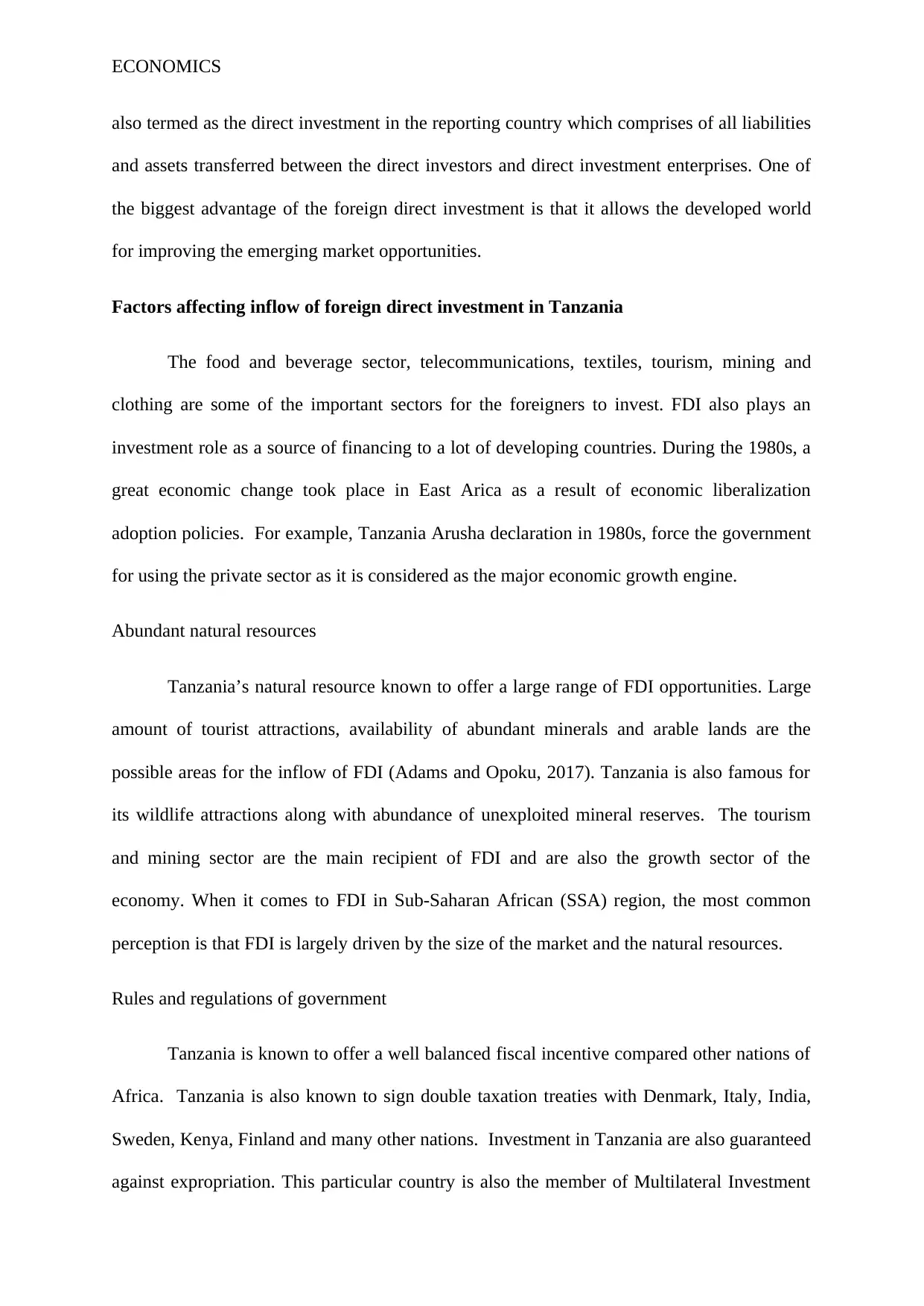
ECONOMICS
also termed as the direct investment in the reporting country which comprises of all liabilities
and assets transferred between the direct investors and direct investment enterprises. One of
the biggest advantage of the foreign direct investment is that it allows the developed world
for improving the emerging market opportunities.
Factors affecting inflow of foreign direct investment in Tanzania
The food and beverage sector, telecommunications, textiles, tourism, mining and
clothing are some of the important sectors for the foreigners to invest. FDI also plays an
investment role as a source of financing to a lot of developing countries. During the 1980s, a
great economic change took place in East Arica as a result of economic liberalization
adoption policies. For example, Tanzania Arusha declaration in 1980s, force the government
for using the private sector as it is considered as the major economic growth engine.
Abundant natural resources
Tanzania’s natural resource known to offer a large range of FDI opportunities. Large
amount of tourist attractions, availability of abundant minerals and arable lands are the
possible areas for the inflow of FDI (Adams and Opoku, 2017). Tanzania is also famous for
its wildlife attractions along with abundance of unexploited mineral reserves. The tourism
and mining sector are the main recipient of FDI and are also the growth sector of the
economy. When it comes to FDI in Sub-Saharan African (SSA) region, the most common
perception is that FDI is largely driven by the size of the market and the natural resources.
Rules and regulations of government
Tanzania is known to offer a well balanced fiscal incentive compared other nations of
Africa. Tanzania is also known to sign double taxation treaties with Denmark, Italy, India,
Sweden, Kenya, Finland and many other nations. Investment in Tanzania are also guaranteed
against expropriation. This particular country is also the member of Multilateral Investment
also termed as the direct investment in the reporting country which comprises of all liabilities
and assets transferred between the direct investors and direct investment enterprises. One of
the biggest advantage of the foreign direct investment is that it allows the developed world
for improving the emerging market opportunities.
Factors affecting inflow of foreign direct investment in Tanzania
The food and beverage sector, telecommunications, textiles, tourism, mining and
clothing are some of the important sectors for the foreigners to invest. FDI also plays an
investment role as a source of financing to a lot of developing countries. During the 1980s, a
great economic change took place in East Arica as a result of economic liberalization
adoption policies. For example, Tanzania Arusha declaration in 1980s, force the government
for using the private sector as it is considered as the major economic growth engine.
Abundant natural resources
Tanzania’s natural resource known to offer a large range of FDI opportunities. Large
amount of tourist attractions, availability of abundant minerals and arable lands are the
possible areas for the inflow of FDI (Adams and Opoku, 2017). Tanzania is also famous for
its wildlife attractions along with abundance of unexploited mineral reserves. The tourism
and mining sector are the main recipient of FDI and are also the growth sector of the
economy. When it comes to FDI in Sub-Saharan African (SSA) region, the most common
perception is that FDI is largely driven by the size of the market and the natural resources.
Rules and regulations of government
Tanzania is known to offer a well balanced fiscal incentive compared other nations of
Africa. Tanzania is also known to sign double taxation treaties with Denmark, Italy, India,
Sweden, Kenya, Finland and many other nations. Investment in Tanzania are also guaranteed
against expropriation. This particular country is also the member of Multilateral Investment
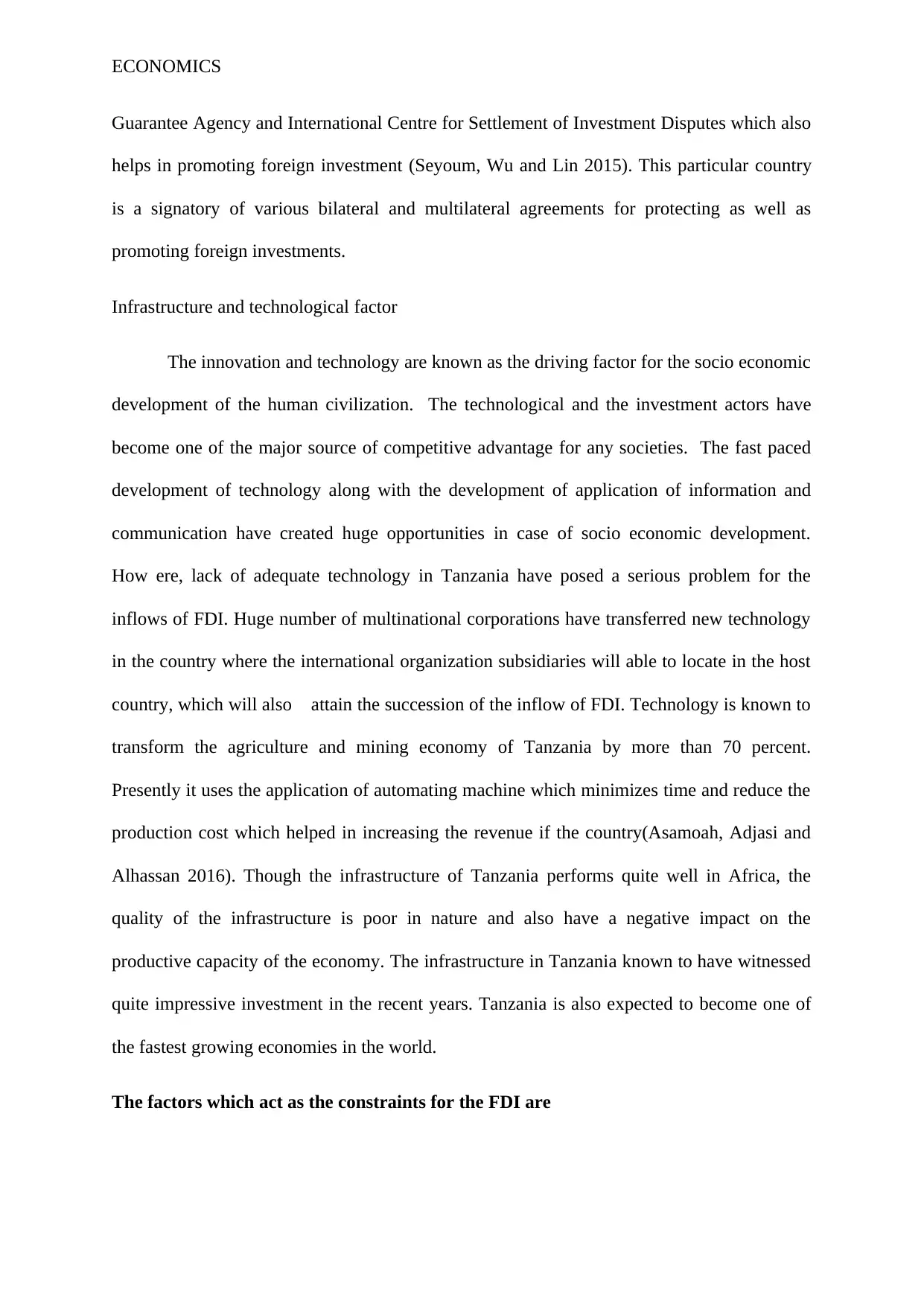
ECONOMICS
Guarantee Agency and International Centre for Settlement of Investment Disputes which also
helps in promoting foreign investment (Seyoum, Wu and Lin 2015). This particular country
is a signatory of various bilateral and multilateral agreements for protecting as well as
promoting foreign investments.
Infrastructure and technological factor
The innovation and technology are known as the driving factor for the socio economic
development of the human civilization. The technological and the investment actors have
become one of the major source of competitive advantage for any societies. The fast paced
development of technology along with the development of application of information and
communication have created huge opportunities in case of socio economic development.
How ere, lack of adequate technology in Tanzania have posed a serious problem for the
inflows of FDI. Huge number of multinational corporations have transferred new technology
in the country where the international organization subsidiaries will able to locate in the host
country, which will also attain the succession of the inflow of FDI. Technology is known to
transform the agriculture and mining economy of Tanzania by more than 70 percent.
Presently it uses the application of automating machine which minimizes time and reduce the
production cost which helped in increasing the revenue if the country(Asamoah, Adjasi and
Alhassan 2016). Though the infrastructure of Tanzania performs quite well in Africa, the
quality of the infrastructure is poor in nature and also have a negative impact on the
productive capacity of the economy. The infrastructure in Tanzania known to have witnessed
quite impressive investment in the recent years. Tanzania is also expected to become one of
the fastest growing economies in the world.
The factors which act as the constraints for the FDI are
Guarantee Agency and International Centre for Settlement of Investment Disputes which also
helps in promoting foreign investment (Seyoum, Wu and Lin 2015). This particular country
is a signatory of various bilateral and multilateral agreements for protecting as well as
promoting foreign investments.
Infrastructure and technological factor
The innovation and technology are known as the driving factor for the socio economic
development of the human civilization. The technological and the investment actors have
become one of the major source of competitive advantage for any societies. The fast paced
development of technology along with the development of application of information and
communication have created huge opportunities in case of socio economic development.
How ere, lack of adequate technology in Tanzania have posed a serious problem for the
inflows of FDI. Huge number of multinational corporations have transferred new technology
in the country where the international organization subsidiaries will able to locate in the host
country, which will also attain the succession of the inflow of FDI. Technology is known to
transform the agriculture and mining economy of Tanzania by more than 70 percent.
Presently it uses the application of automating machine which minimizes time and reduce the
production cost which helped in increasing the revenue if the country(Asamoah, Adjasi and
Alhassan 2016). Though the infrastructure of Tanzania performs quite well in Africa, the
quality of the infrastructure is poor in nature and also have a negative impact on the
productive capacity of the economy. The infrastructure in Tanzania known to have witnessed
quite impressive investment in the recent years. Tanzania is also expected to become one of
the fastest growing economies in the world.
The factors which act as the constraints for the FDI are
⊘ This is a preview!⊘
Do you want full access?
Subscribe today to unlock all pages.

Trusted by 1+ million students worldwide
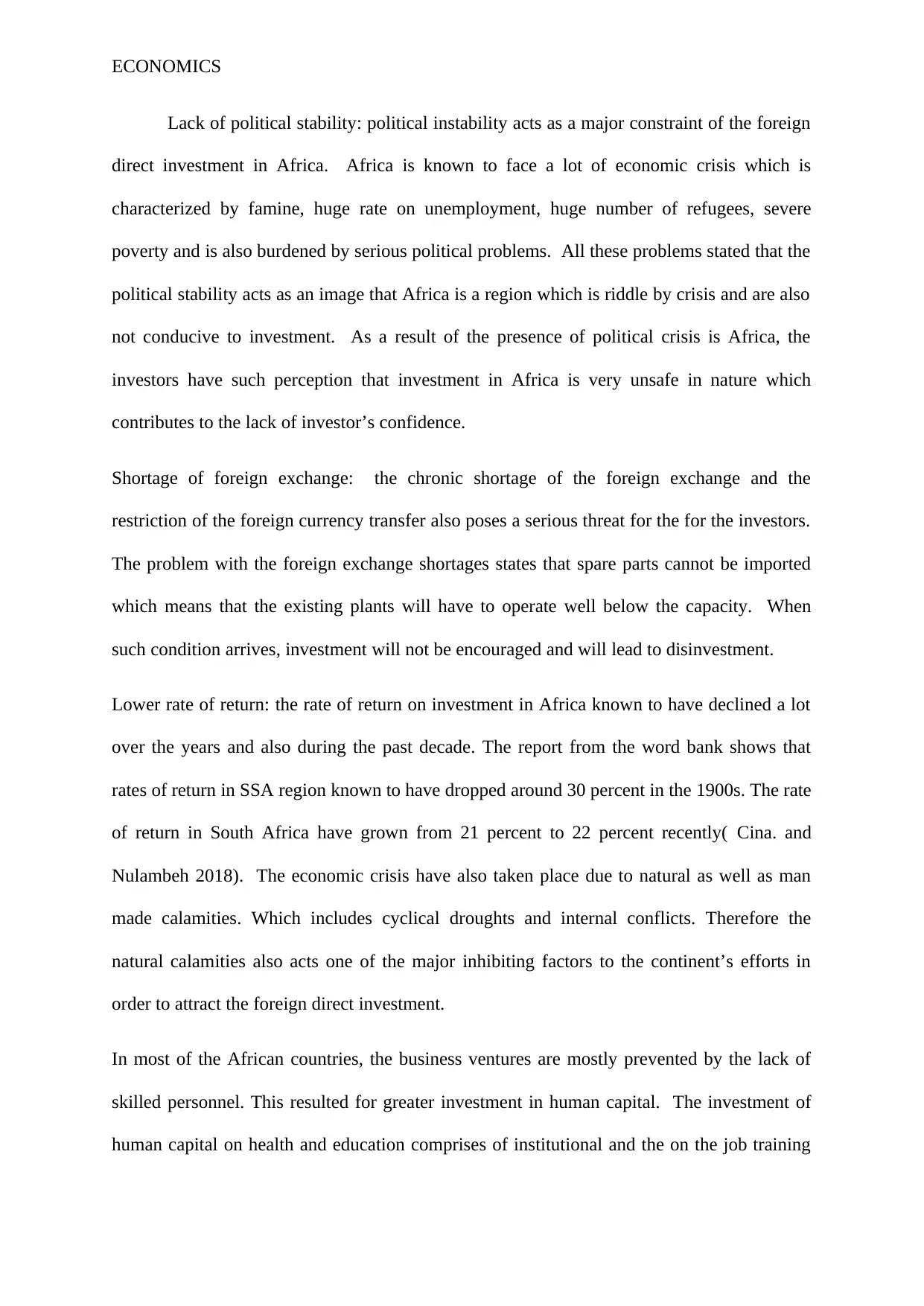
ECONOMICS
Lack of political stability: political instability acts as a major constraint of the foreign
direct investment in Africa. Africa is known to face a lot of economic crisis which is
characterized by famine, huge rate on unemployment, huge number of refugees, severe
poverty and is also burdened by serious political problems. All these problems stated that the
political stability acts as an image that Africa is a region which is riddle by crisis and are also
not conducive to investment. As a result of the presence of political crisis is Africa, the
investors have such perception that investment in Africa is very unsafe in nature which
contributes to the lack of investor’s confidence.
Shortage of foreign exchange: the chronic shortage of the foreign exchange and the
restriction of the foreign currency transfer also poses a serious threat for the for the investors.
The problem with the foreign exchange shortages states that spare parts cannot be imported
which means that the existing plants will have to operate well below the capacity. When
such condition arrives, investment will not be encouraged and will lead to disinvestment.
Lower rate of return: the rate of return on investment in Africa known to have declined a lot
over the years and also during the past decade. The report from the word bank shows that
rates of return in SSA region known to have dropped around 30 percent in the 1900s. The rate
of return in South Africa have grown from 21 percent to 22 percent recently( Cina. and
Nulambeh 2018). The economic crisis have also taken place due to natural as well as man
made calamities. Which includes cyclical droughts and internal conflicts. Therefore the
natural calamities also acts one of the major inhibiting factors to the continent’s efforts in
order to attract the foreign direct investment.
In most of the African countries, the business ventures are mostly prevented by the lack of
skilled personnel. This resulted for greater investment in human capital. The investment of
human capital on health and education comprises of institutional and the on the job training
Lack of political stability: political instability acts as a major constraint of the foreign
direct investment in Africa. Africa is known to face a lot of economic crisis which is
characterized by famine, huge rate on unemployment, huge number of refugees, severe
poverty and is also burdened by serious political problems. All these problems stated that the
political stability acts as an image that Africa is a region which is riddle by crisis and are also
not conducive to investment. As a result of the presence of political crisis is Africa, the
investors have such perception that investment in Africa is very unsafe in nature which
contributes to the lack of investor’s confidence.
Shortage of foreign exchange: the chronic shortage of the foreign exchange and the
restriction of the foreign currency transfer also poses a serious threat for the for the investors.
The problem with the foreign exchange shortages states that spare parts cannot be imported
which means that the existing plants will have to operate well below the capacity. When
such condition arrives, investment will not be encouraged and will lead to disinvestment.
Lower rate of return: the rate of return on investment in Africa known to have declined a lot
over the years and also during the past decade. The report from the word bank shows that
rates of return in SSA region known to have dropped around 30 percent in the 1900s. The rate
of return in South Africa have grown from 21 percent to 22 percent recently( Cina. and
Nulambeh 2018). The economic crisis have also taken place due to natural as well as man
made calamities. Which includes cyclical droughts and internal conflicts. Therefore the
natural calamities also acts one of the major inhibiting factors to the continent’s efforts in
order to attract the foreign direct investment.
In most of the African countries, the business ventures are mostly prevented by the lack of
skilled personnel. This resulted for greater investment in human capital. The investment of
human capital on health and education comprises of institutional and the on the job training
Paraphrase This Document
Need a fresh take? Get an instant paraphrase of this document with our AI Paraphraser
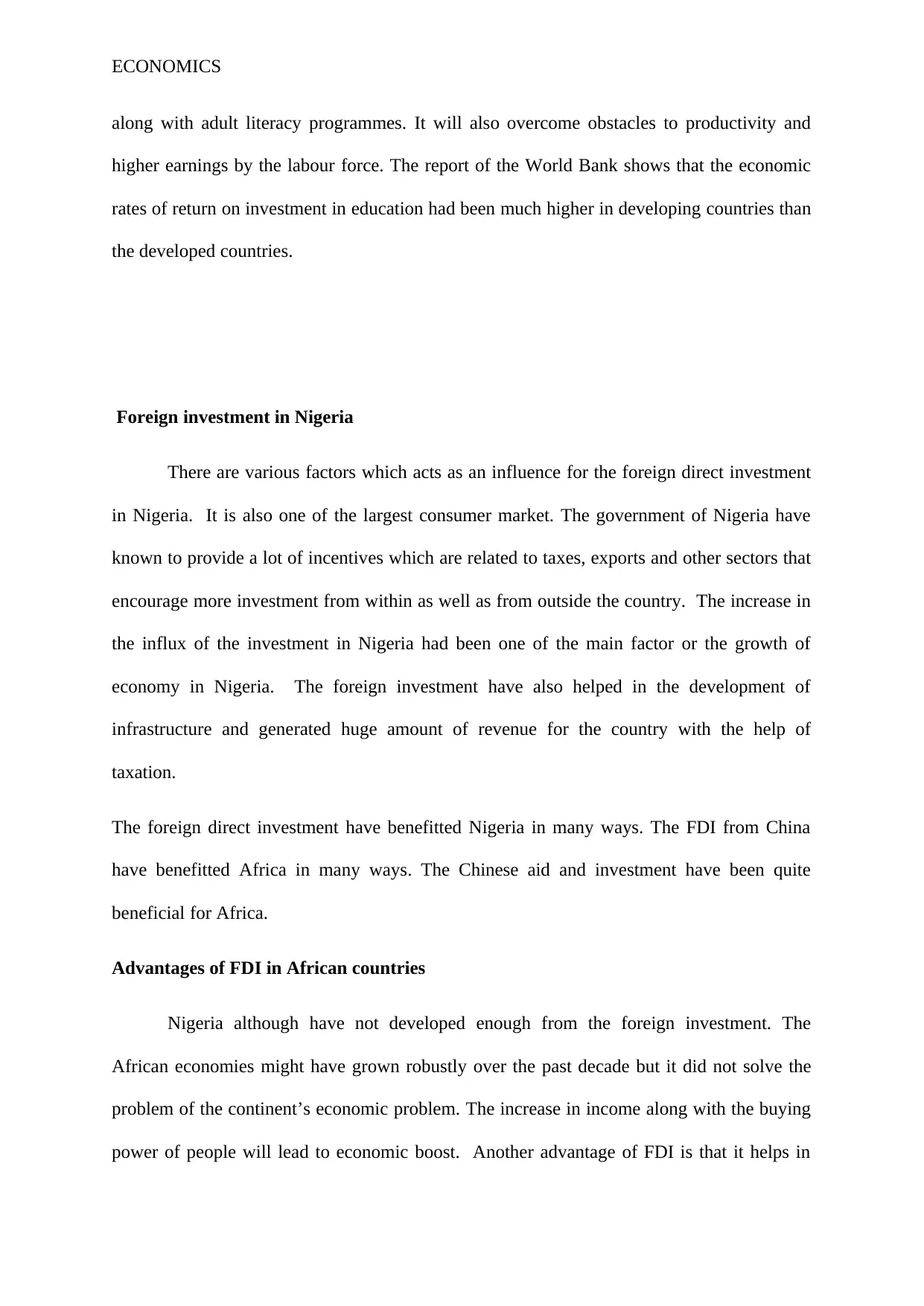
ECONOMICS
along with adult literacy programmes. It will also overcome obstacles to productivity and
higher earnings by the labour force. The report of the World Bank shows that the economic
rates of return on investment in education had been much higher in developing countries than
the developed countries.
Foreign investment in Nigeria
There are various factors which acts as an influence for the foreign direct investment
in Nigeria. It is also one of the largest consumer market. The government of Nigeria have
known to provide a lot of incentives which are related to taxes, exports and other sectors that
encourage more investment from within as well as from outside the country. The increase in
the influx of the investment in Nigeria had been one of the main factor or the growth of
economy in Nigeria. The foreign investment have also helped in the development of
infrastructure and generated huge amount of revenue for the country with the help of
taxation.
The foreign direct investment have benefitted Nigeria in many ways. The FDI from China
have benefitted Africa in many ways. The Chinese aid and investment have been quite
beneficial for Africa.
Advantages of FDI in African countries
Nigeria although have not developed enough from the foreign investment. The
African economies might have grown robustly over the past decade but it did not solve the
problem of the continent’s economic problem. The increase in income along with the buying
power of people will lead to economic boost. Another advantage of FDI is that it helps in
along with adult literacy programmes. It will also overcome obstacles to productivity and
higher earnings by the labour force. The report of the World Bank shows that the economic
rates of return on investment in education had been much higher in developing countries than
the developed countries.
Foreign investment in Nigeria
There are various factors which acts as an influence for the foreign direct investment
in Nigeria. It is also one of the largest consumer market. The government of Nigeria have
known to provide a lot of incentives which are related to taxes, exports and other sectors that
encourage more investment from within as well as from outside the country. The increase in
the influx of the investment in Nigeria had been one of the main factor or the growth of
economy in Nigeria. The foreign investment have also helped in the development of
infrastructure and generated huge amount of revenue for the country with the help of
taxation.
The foreign direct investment have benefitted Nigeria in many ways. The FDI from China
have benefitted Africa in many ways. The Chinese aid and investment have been quite
beneficial for Africa.
Advantages of FDI in African countries
Nigeria although have not developed enough from the foreign investment. The
African economies might have grown robustly over the past decade but it did not solve the
problem of the continent’s economic problem. The increase in income along with the buying
power of people will lead to economic boost. Another advantage of FDI is that it helps in
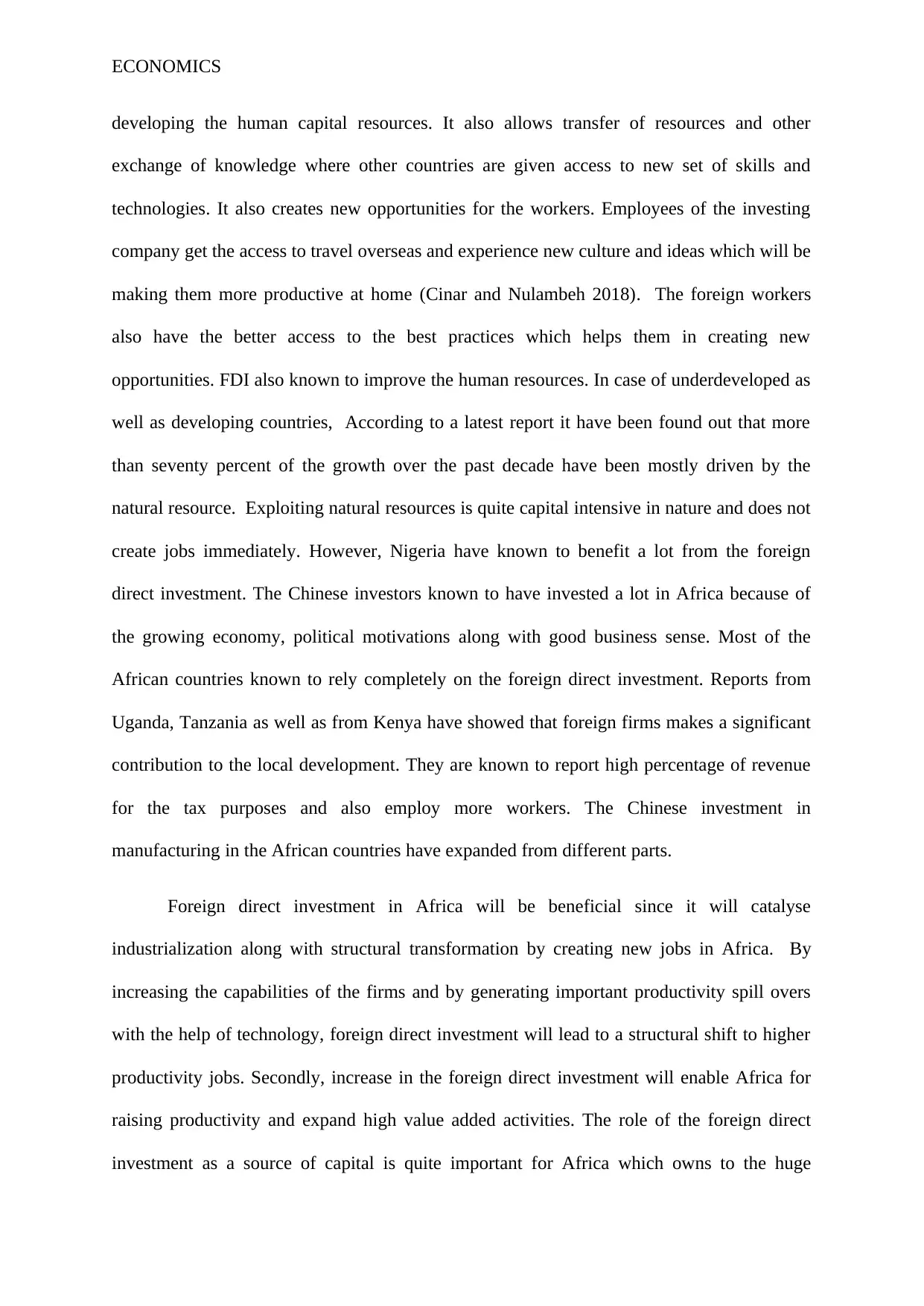
ECONOMICS
developing the human capital resources. It also allows transfer of resources and other
exchange of knowledge where other countries are given access to new set of skills and
technologies. It also creates new opportunities for the workers. Employees of the investing
company get the access to travel overseas and experience new culture and ideas which will be
making them more productive at home (Cinar and Nulambeh 2018). The foreign workers
also have the better access to the best practices which helps them in creating new
opportunities. FDI also known to improve the human resources. In case of underdeveloped as
well as developing countries, According to a latest report it have been found out that more
than seventy percent of the growth over the past decade have been mostly driven by the
natural resource. Exploiting natural resources is quite capital intensive in nature and does not
create jobs immediately. However, Nigeria have known to benefit a lot from the foreign
direct investment. The Chinese investors known to have invested a lot in Africa because of
the growing economy, political motivations along with good business sense. Most of the
African countries known to rely completely on the foreign direct investment. Reports from
Uganda, Tanzania as well as from Kenya have showed that foreign firms makes a significant
contribution to the local development. They are known to report high percentage of revenue
for the tax purposes and also employ more workers. The Chinese investment in
manufacturing in the African countries have expanded from different parts.
Foreign direct investment in Africa will be beneficial since it will catalyse
industrialization along with structural transformation by creating new jobs in Africa. By
increasing the capabilities of the firms and by generating important productivity spill overs
with the help of technology, foreign direct investment will lead to a structural shift to higher
productivity jobs. Secondly, increase in the foreign direct investment will enable Africa for
raising productivity and expand high value added activities. The role of the foreign direct
investment as a source of capital is quite important for Africa which owns to the huge
developing the human capital resources. It also allows transfer of resources and other
exchange of knowledge where other countries are given access to new set of skills and
technologies. It also creates new opportunities for the workers. Employees of the investing
company get the access to travel overseas and experience new culture and ideas which will be
making them more productive at home (Cinar and Nulambeh 2018). The foreign workers
also have the better access to the best practices which helps them in creating new
opportunities. FDI also known to improve the human resources. In case of underdeveloped as
well as developing countries, According to a latest report it have been found out that more
than seventy percent of the growth over the past decade have been mostly driven by the
natural resource. Exploiting natural resources is quite capital intensive in nature and does not
create jobs immediately. However, Nigeria have known to benefit a lot from the foreign
direct investment. The Chinese investors known to have invested a lot in Africa because of
the growing economy, political motivations along with good business sense. Most of the
African countries known to rely completely on the foreign direct investment. Reports from
Uganda, Tanzania as well as from Kenya have showed that foreign firms makes a significant
contribution to the local development. They are known to report high percentage of revenue
for the tax purposes and also employ more workers. The Chinese investment in
manufacturing in the African countries have expanded from different parts.
Foreign direct investment in Africa will be beneficial since it will catalyse
industrialization along with structural transformation by creating new jobs in Africa. By
increasing the capabilities of the firms and by generating important productivity spill overs
with the help of technology, foreign direct investment will lead to a structural shift to higher
productivity jobs. Secondly, increase in the foreign direct investment will enable Africa for
raising productivity and expand high value added activities. The role of the foreign direct
investment as a source of capital is quite important for Africa which owns to the huge
⊘ This is a preview!⊘
Do you want full access?
Subscribe today to unlock all pages.

Trusted by 1+ million students worldwide
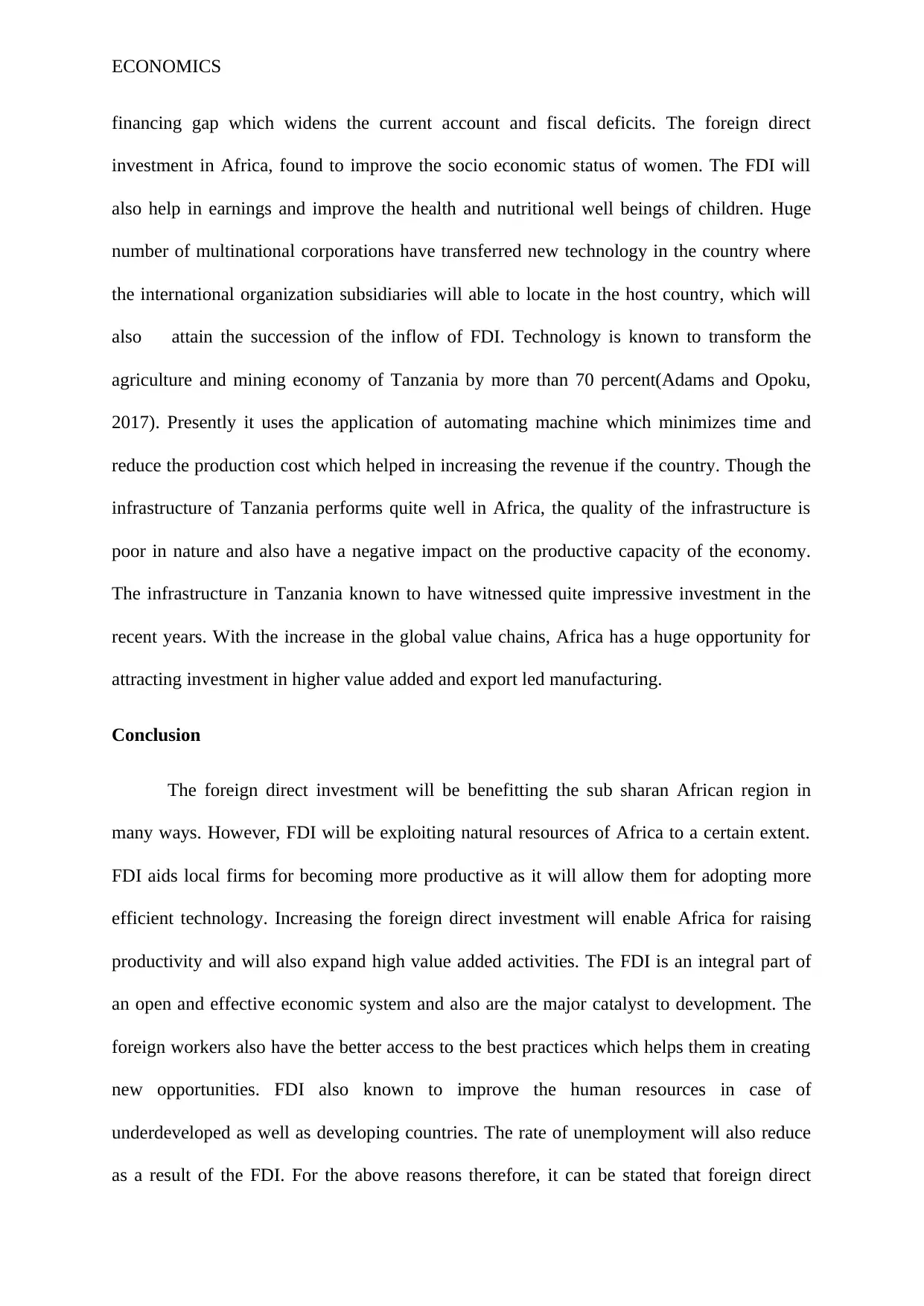
ECONOMICS
financing gap which widens the current account and fiscal deficits. The foreign direct
investment in Africa, found to improve the socio economic status of women. The FDI will
also help in earnings and improve the health and nutritional well beings of children. Huge
number of multinational corporations have transferred new technology in the country where
the international organization subsidiaries will able to locate in the host country, which will
also attain the succession of the inflow of FDI. Technology is known to transform the
agriculture and mining economy of Tanzania by more than 70 percent(Adams and Opoku,
2017). Presently it uses the application of automating machine which minimizes time and
reduce the production cost which helped in increasing the revenue if the country. Though the
infrastructure of Tanzania performs quite well in Africa, the quality of the infrastructure is
poor in nature and also have a negative impact on the productive capacity of the economy.
The infrastructure in Tanzania known to have witnessed quite impressive investment in the
recent years. With the increase in the global value chains, Africa has a huge opportunity for
attracting investment in higher value added and export led manufacturing.
Conclusion
The foreign direct investment will be benefitting the sub sharan African region in
many ways. However, FDI will be exploiting natural resources of Africa to a certain extent.
FDI aids local firms for becoming more productive as it will allow them for adopting more
efficient technology. Increasing the foreign direct investment will enable Africa for raising
productivity and will also expand high value added activities. The FDI is an integral part of
an open and effective economic system and also are the major catalyst to development. The
foreign workers also have the better access to the best practices which helps them in creating
new opportunities. FDI also known to improve the human resources in case of
underdeveloped as well as developing countries. The rate of unemployment will also reduce
as a result of the FDI. For the above reasons therefore, it can be stated that foreign direct
financing gap which widens the current account and fiscal deficits. The foreign direct
investment in Africa, found to improve the socio economic status of women. The FDI will
also help in earnings and improve the health and nutritional well beings of children. Huge
number of multinational corporations have transferred new technology in the country where
the international organization subsidiaries will able to locate in the host country, which will
also attain the succession of the inflow of FDI. Technology is known to transform the
agriculture and mining economy of Tanzania by more than 70 percent(Adams and Opoku,
2017). Presently it uses the application of automating machine which minimizes time and
reduce the production cost which helped in increasing the revenue if the country. Though the
infrastructure of Tanzania performs quite well in Africa, the quality of the infrastructure is
poor in nature and also have a negative impact on the productive capacity of the economy.
The infrastructure in Tanzania known to have witnessed quite impressive investment in the
recent years. With the increase in the global value chains, Africa has a huge opportunity for
attracting investment in higher value added and export led manufacturing.
Conclusion
The foreign direct investment will be benefitting the sub sharan African region in
many ways. However, FDI will be exploiting natural resources of Africa to a certain extent.
FDI aids local firms for becoming more productive as it will allow them for adopting more
efficient technology. Increasing the foreign direct investment will enable Africa for raising
productivity and will also expand high value added activities. The FDI is an integral part of
an open and effective economic system and also are the major catalyst to development. The
foreign workers also have the better access to the best practices which helps them in creating
new opportunities. FDI also known to improve the human resources in case of
underdeveloped as well as developing countries. The rate of unemployment will also reduce
as a result of the FDI. For the above reasons therefore, it can be stated that foreign direct
Paraphrase This Document
Need a fresh take? Get an instant paraphrase of this document with our AI Paraphraser

ECONOMICS
investment will be playing a huge role in the transformation of Africa over the past decade
and will certainly bring resources to the continent.
investment will be playing a huge role in the transformation of Africa over the past decade
and will certainly bring resources to the continent.
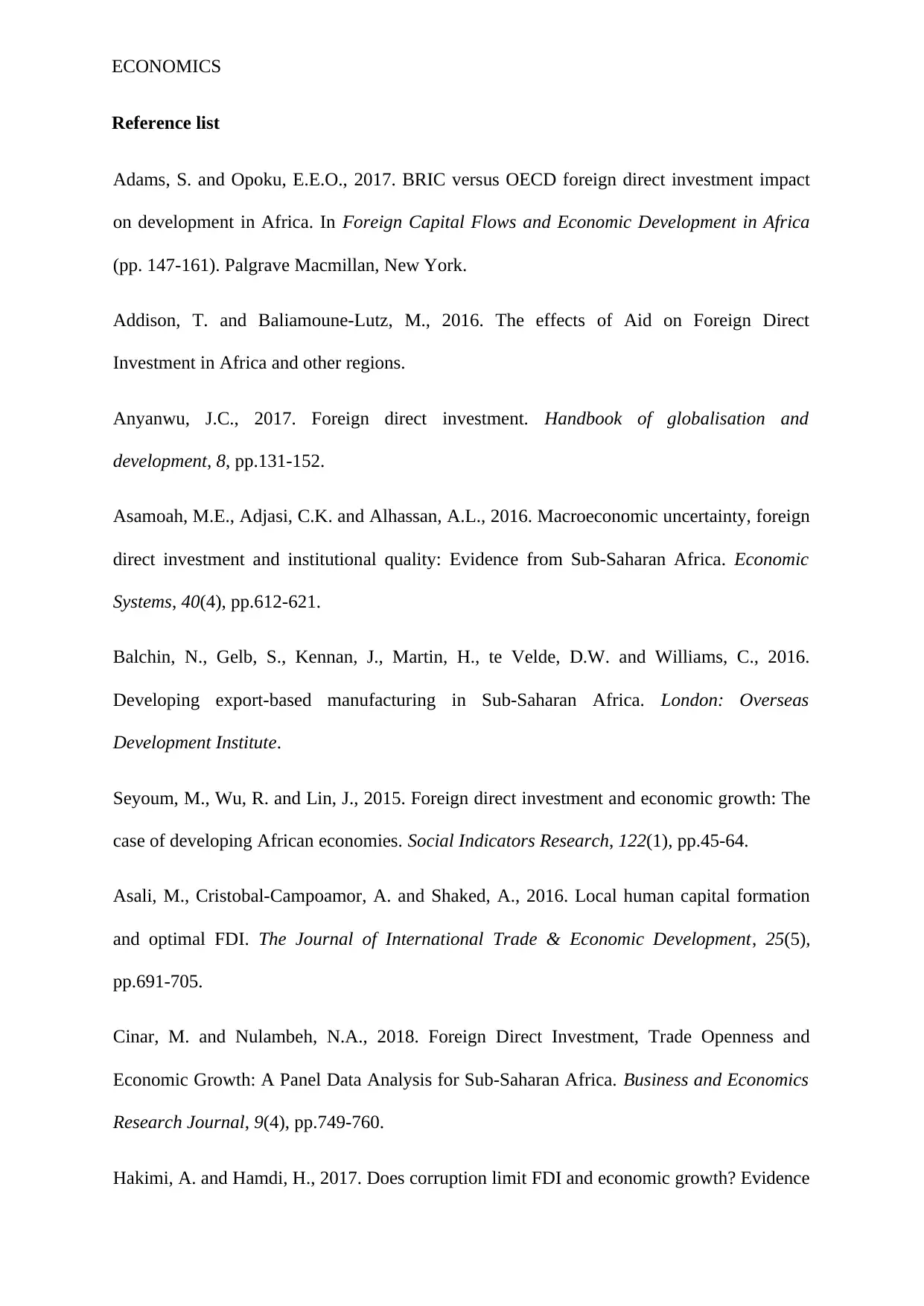
ECONOMICS
Reference list
Adams, S. and Opoku, E.E.O., 2017. BRIC versus OECD foreign direct investment impact
on development in Africa. In Foreign Capital Flows and Economic Development in Africa
(pp. 147-161). Palgrave Macmillan, New York.
Addison, T. and Baliamoune-Lutz, M., 2016. The effects of Aid on Foreign Direct
Investment in Africa and other regions.
Anyanwu, J.C., 2017. Foreign direct investment. Handbook of globalisation and
development, 8, pp.131-152.
Asamoah, M.E., Adjasi, C.K. and Alhassan, A.L., 2016. Macroeconomic uncertainty, foreign
direct investment and institutional quality: Evidence from Sub-Saharan Africa. Economic
Systems, 40(4), pp.612-621.
Balchin, N., Gelb, S., Kennan, J., Martin, H., te Velde, D.W. and Williams, C., 2016.
Developing export-based manufacturing in Sub-Saharan Africa. London: Overseas
Development Institute.
Seyoum, M., Wu, R. and Lin, J., 2015. Foreign direct investment and economic growth: The
case of developing African economies. Social Indicators Research, 122(1), pp.45-64.
Asali, M., Cristobal-Campoamor, A. and Shaked, A., 2016. Local human capital formation
and optimal FDI. The Journal of International Trade & Economic Development, 25(5),
pp.691-705.
Cinar, M. and Nulambeh, N.A., 2018. Foreign Direct Investment, Trade Openness and
Economic Growth: A Panel Data Analysis for Sub-Saharan Africa. Business and Economics
Research Journal, 9(4), pp.749-760.
Hakimi, A. and Hamdi, H., 2017. Does corruption limit FDI and economic growth? Evidence
Reference list
Adams, S. and Opoku, E.E.O., 2017. BRIC versus OECD foreign direct investment impact
on development in Africa. In Foreign Capital Flows and Economic Development in Africa
(pp. 147-161). Palgrave Macmillan, New York.
Addison, T. and Baliamoune-Lutz, M., 2016. The effects of Aid on Foreign Direct
Investment in Africa and other regions.
Anyanwu, J.C., 2017. Foreign direct investment. Handbook of globalisation and
development, 8, pp.131-152.
Asamoah, M.E., Adjasi, C.K. and Alhassan, A.L., 2016. Macroeconomic uncertainty, foreign
direct investment and institutional quality: Evidence from Sub-Saharan Africa. Economic
Systems, 40(4), pp.612-621.
Balchin, N., Gelb, S., Kennan, J., Martin, H., te Velde, D.W. and Williams, C., 2016.
Developing export-based manufacturing in Sub-Saharan Africa. London: Overseas
Development Institute.
Seyoum, M., Wu, R. and Lin, J., 2015. Foreign direct investment and economic growth: The
case of developing African economies. Social Indicators Research, 122(1), pp.45-64.
Asali, M., Cristobal-Campoamor, A. and Shaked, A., 2016. Local human capital formation
and optimal FDI. The Journal of International Trade & Economic Development, 25(5),
pp.691-705.
Cinar, M. and Nulambeh, N.A., 2018. Foreign Direct Investment, Trade Openness and
Economic Growth: A Panel Data Analysis for Sub-Saharan Africa. Business and Economics
Research Journal, 9(4), pp.749-760.
Hakimi, A. and Hamdi, H., 2017. Does corruption limit FDI and economic growth? Evidence
⊘ This is a preview!⊘
Do you want full access?
Subscribe today to unlock all pages.

Trusted by 1+ million students worldwide
1 out of 14
Related Documents
Your All-in-One AI-Powered Toolkit for Academic Success.
+13062052269
info@desklib.com
Available 24*7 on WhatsApp / Email
![[object Object]](/_next/static/media/star-bottom.7253800d.svg)
Unlock your academic potential
Copyright © 2020–2026 A2Z Services. All Rights Reserved. Developed and managed by ZUCOL.





